[Dec 2007, Volume 4 Quarterly Issue] Pdf File size - The IIPM Think ...
[Dec 2007, Volume 4 Quarterly Issue] Pdf File size - The IIPM Think ...
[Dec 2007, Volume 4 Quarterly Issue] Pdf File size - The IIPM Think ...
Create successful ePaper yourself
Turn your PDF publications into a flip-book with our unique Google optimized e-Paper software.
MORE MARKETS, LESS GOVERNMENT<br />
in international law until 1948 when<br />
the Universal <strong>Dec</strong>laration of Human<br />
Rights (UDHR) was signed. This document<br />
enshrines principles of equality<br />
and justice, and the sanctity of a person’s<br />
rights regardless of their ethnicity,<br />
religion or gender. <strong>The</strong> first sentence<br />
of the 1948 <strong>Dec</strong>laration states<br />
that “inherent human dignity” should<br />
be recognized. As such, a balanced application<br />
of human rights principles<br />
would not impose social responsibilities<br />
that come into conflict with<br />
personal rights.<br />
But some attempts to curb assaults<br />
on the dignity of human beings have<br />
contributed to the continuing problems<br />
that offend a collective sense of justice.<br />
Indeed, many of the most vocal supporters<br />
of so-called human rights actually<br />
promote legal concepts that inadvertently<br />
support the sort of misconduct<br />
they wish to see ended. In particular,<br />
demands for human rights in terms of<br />
social or collective rights undermine<br />
the universality intended by the drafters<br />
of the UDHR. For example, government<br />
officials frequently engage in<br />
populist promises that define rights<br />
based on economic or social characteristics.<br />
In modern times, there has been<br />
an emergence of identity politics<br />
whereby leaders of group-based movements<br />
claim they represent the interests<br />
of groups defined by ethnicity,<br />
class, religion, gender, sexual orientation<br />
or other criteria.<br />
A focus on group “rights” divides<br />
communities into distinctive and separate<br />
political classes that are in conflict<br />
with the interests and rights of other<br />
groups. Demands for an assignment of<br />
rights as a matter of law tend to be<br />
based on a perception of some historical<br />
oppression or victimhood. In the<br />
first instance, assignment of particular<br />
rights contradicts a notion of universal<br />
rights wherein all humans possess<br />
equal rights regardless of differences<br />
race or ethnicity. And basing human<br />
rights upon collective concepts of<br />
“fundamental” social rights leads to<br />
zero or negative-sum policy outcomes<br />
with some groups benefiting and others<br />
losing. One common intrusion to<br />
individual liberties relating is the imposition<br />
of limits on the exercise of<br />
private property rights and the freedom<br />
of exchange. In this regard, the<br />
excesses of protectionism and unlawful<br />
expropriation are legendary. <strong>The</strong>re is<br />
an unfortunate tendency for few objections<br />
being raised when the assets of<br />
private corporations are nationalized.<br />
But this indifference overlooks the fact<br />
that acts that diminish economic<br />
freedoms provide the logic and mechanisms<br />
for reducing civic and political<br />
freedoms. Those wishing to support<br />
human rights should consider that<br />
rights and dignity of humans are best<br />
preserved through rigorous support for<br />
individual rights and the Rule of Law.<br />
As it is, proponents of collective or<br />
group rights that ignore the key role of<br />
individuals as bearers of rights guaranteed<br />
to autonomous humans undermine<br />
the Rule of Law.<br />
Indeed, the assertion of group rights<br />
over individual rights provided the basis<br />
for the injustices of apartheid in<br />
South Africa and genocide in other<br />
parts of the world. <strong>The</strong> assignment of<br />
group rights in the case of apartheid is<br />
a worst-case scenario of abuses arising<br />
from the violation of these generality<br />
conditions. But other extreme acts<br />
arising out of the exclusivity of ethnic<br />
nationalism had destructive consequences<br />
in the Balkans and plague<br />
other parts of the world.<br />
References to social or collective or<br />
group rights mask the fact that assignment<br />
of such rights may involve empowerment<br />
or possessions that require<br />
the action or aid of others. In the process<br />
of activating such group rights, the<br />
rights of other individuals will be violated<br />
by imposing obligation upon<br />
them. Rights that impose obligations<br />
necessarily attenuate the freedom of<br />
choice and action of others. In such an<br />
order, human beings are treated as objects<br />
or servants of the community<br />
Rights that impose obligations necessarily attenuate the<br />
freedom of choice and action of others. In such an order,<br />
human beings are treated as objects or servants of the<br />
community rather than valued as unique individuals<br />
rather than valued as unique individuals.<br />
Whereas the assignment and enforcement<br />
of individual rights encourages<br />
coordination and cooperation,<br />
collectivized rights involve conflict<br />
and require coercion. As it turns out,<br />
many of the countries that suffer most<br />
from communal violence and sectarianism<br />
are those that have imple<br />
mented policies that define rights of<br />
minorities. Clearly, this approach has<br />
not worked.<br />
A collectivistic approach to human<br />
THE INDIA ECONOMY REVIEW<br />
13


![[Dec 2007, Volume 4 Quarterly Issue] Pdf File size - The IIPM Think ...](https://img.yumpu.com/29766298/12/500x640/dec-2007-volume-4-quarterly-issue-pdf-file-size-the-iipm-think-.jpg)

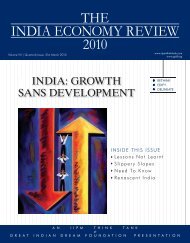
![[Feb 2008, Volume V Annual Issue] Pdf File size - The IIPM Think Tank](https://img.yumpu.com/43961117/1/190x245/feb-2008-volume-v-annual-issue-pdf-file-size-the-iipm-think-tank.jpg?quality=85)
![[June 2008, Volume V Quarterly Issue] Pdf File size - The IIPM Think ...](https://img.yumpu.com/41693247/1/190x245/june-2008-volume-v-quarterly-issue-pdf-file-size-the-iipm-think-.jpg?quality=85)


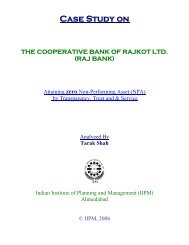


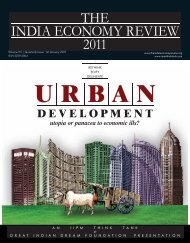

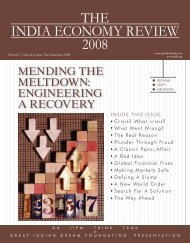
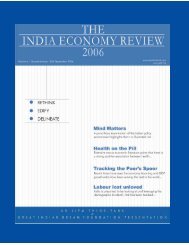
![[Volume VI | Quarterly Issue: 31st May 2009] Pdf File size](https://img.yumpu.com/27796051/1/190x245/volume-vi-quarterly-issue-31st-may-2009-pdf-file-size.jpg?quality=85)